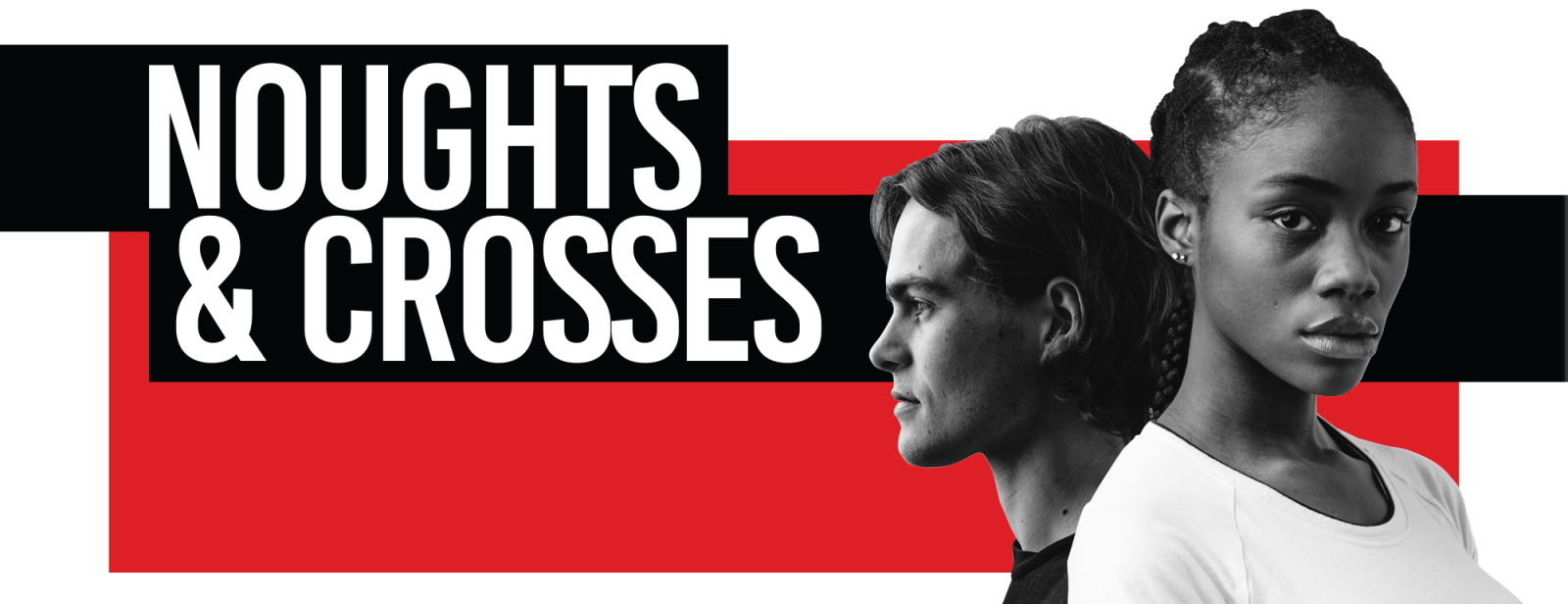The 'Noughts and Crosses' series of novels by Children's Laureate Malorie Blackman have been a huge hit with teen audiences throughout the world ever since their initial publication almost twenty years ago. The dystopian society that they portray is one where racial norms are subverted and the white 'Noughts' are an underclass, subject to the laws of a ruling black elite called the 'Crosses'.
Born into this horrific ''reverse apartheid' system are Sephy (Heather Agyepong) and Callum (Billy Harris), friends since childhood who are forced to confront the entrenched racism within their society, with harrowing results for themselves and their families. Blackman has worked closely with Sabrina Mahfouz to adapt the first novel into this stage production, brought to life by Pilot Theatre, a York based company wishing to bring theatre to a younger audience. In this initial aim they have succeeded hugely with this production, the tight Quays Theatre at The Lowry was packed with a teenage audience who hung on every word and roared their appreciation at the conclusion.
As the story of Sephy and Callum unfolds, we see a pair of children grow into star crossed lovers, with both their families and wider society forcing them to hide their developing relationship. Sephy, the daughter of a prominent politician Kamal (Chris Jack), rails against her father's racist policies, whilst Callum watches his own family become increasingly radicalised as they turn away from peaceful protest towards terrorism, eventually succumbing himself.  Agyepong delivers a steely performance, displaying both the softness and strength required in Sephy and her character arc is subtly defined as she finds the determination required to defy her family and wider society. She is ably supported by Harris and the small cast of eight actors who take on the multiplicity of roles, Doreene Blackstock particularly taking the eye as the drunken mother Jasmine.
Agyepong delivers a steely performance, displaying both the softness and strength required in Sephy and her character arc is subtly defined as she finds the determination required to defy her family and wider society. She is ably supported by Harris and the small cast of eight actors who take on the multiplicity of roles, Doreene Blackstock particularly taking the eye as the drunken mother Jasmine.
The Director, Esther Richardson moves the story forward with a series of short fast-paced scenes interspersed with expansive longer speeches breaking the fourth wall to the audience. Designer Simon Kenny responded to this directorial structure brilliantly with a simple red squared backdrop that was utilised in a myriad of inventive ways and allowed both epic and intimate to be convincingly rendered without the necessity of scenery changes.
This adaptation from the novel to the stage is not always successful; the original work showed the society from the perspective of the main protagonists, and that subtle difference of attitude and perspective is lost in the scripted element. The thoughts of the characters were translated into overt exposition of motive which was sometimes clumsy and devolved into character monologues on aspects of racism which were not dramatic in their content. The juxtaposition of the Hadley’s, a wealthy Cross family with the underclass Nought McGregor's, gave the piece another point of conflict in the class structure it represented.The clever use of language (Dagger and Blank) to represent unacceptable racist terms, made a strong point about the power of words to be destructive in any society,
The current huge popularity of dystopian fiction across all of the arts, especially with the young, reflects an insecure world view prompted by political events both domestic and worldwide. Blackman's novels are an enlightened articulation of some of the issues we all face, presented in an accessible form for a nascent teenage mind. However, the medium of theatre did not allow either the scope of the novels or their powerful message to be conveyed as strongly as it deserved. I look forward to the forthcoming television serialisation of the books, which may provide a more satisfying interpretation.
However, Pilot Theatre are to be applauded for their aim, and the 400 plus young adults in the audience last night and the sold out theatres to come on this UK tour, undoubtedly are entitled to disagree with my opinion.
Reviewer: Paul Wilcox
Reviewed: 26th February 2019
North West End Rating: ★★★

